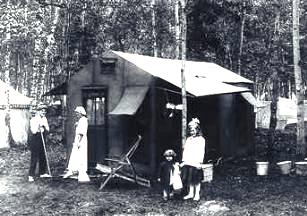
















A List of 20 Common Mistakes That Should Be Avoided
Copyright © January 12, 2011 by Robert Wayne Atkins, P.E.
All Rights Reserved.

Introduction
When people first become aware that our current worldwide economy is far more unstable than they previously realized, and that their life style could change rather drastically in a very short period of time, then they usually panic and they start doing things they would never have done if they had taken the time to carefully think things through to their logical conclusion.
The following suggestions may help you to avoid making some really serious mistakes you may quickly regret.
A List of 20 Common Mistakes That Should be Avoided
- Do not quit your job. Do not quit your job. Do not quit your job. It is okay to have a job in a big city. But you do not have to live inside a big city unless there is no other option. Think carefully about all your options and then pick the best option that is just right for you and your family. Pick an option that balances your risks and your benefits (your paycheck). Life without a paycheck will quickly bring on the hard times you are trying to avoid.
- Do not be motivated by fear. If you do something then do it because it is the most reasonable course of action for you and not because you are afraid that if you don't do it then something bad will happen to you.

- Do not spend your life savings. There is a big difference between spending and investing. Make sure you maintain a reasonable balance between the two.
- Do not invest in anything that will consume a huge piece of your life's savings unless you can justify it based on several totally different but extremely valid reasons. Putting the majority of your life savings into one investment is almost never a smart thing to do.
- Do not buy a ranch or a farm unless you have previous ranching or farming experience. It is okay to invest in vacant farm land or a deserted ranch if it meets your true needs and if you are very knowledgeable about what you are buying. However, the vast majority of people will get swindled investing in property they are not intimately knowledgeable about. Anyone who is trying to sell you property probably does not have your best interests at heart. You should seek out advice from people you know and trust and who have extensive real estate experience and who have nothing to gain or lose one way or the other.
- Do not move to an area where there are very few people and where the winters are horrible based on the false illusion that you will be safer there. There are two reasons why this is not a good idea. First, it only takes one pervert who is mentally deranged, or who is a truly evil person, to kill you and your entire family. And there is no place on the face of the earth where perverts do not live among us. Second, each year severe winter weather kills a lot of people. If you intentionally move to an area that has a history of long horrible winters then your family could easily perish as a result of the bad weather.

- Do not move into the wilderness. Moving into the wilderness should be your last option and it should not be done until after you have completely exhausted all your other options and there is absolutely no other place where you can live in safety. Almost any small community is infinitely better than the wilderness. (Note: Although moving into the wilderness should be your last option, it should still be one of your options. In times of great hardship the wilderness is sometimes the best choice for long-term survival. History is filled with examples of people who were terminated by their own governments because of their ethnic background, or religious beliefs, or political beliefs. In this type of situation the only logical alternative is to disappear into the wilderness until the danger has passed and true justice is restored. If you wish to have any reasonable chance of success living in the wilderness then you should have made some definite plans on where you will go and what you will take with you.)
- Do not buy more food or guns or ammunition than you need. On the other hand, you should have enough food and guns and ammunition to last several years. But resist the temptation to acquire enough food to feed 100 people for 20 years, or to build an arsenal of weapons that could equip a small army.
- Do not buy gold and silver until after you have first acquired the basic fundamental necessities for long-term survival.
- Do not believe everything you hear or everything you read. Use common sense to evaluate all the advice you encounter, including this advice you are now reading.
- Beware of "group think." It is easy to find other people who will agree with your opinions. But that doesn't mean anything. Do not discredit information just because it doesn't agree with your beliefs. Carefully reflect on conflicting data and make sure you have a valid reason for rejecting that information, such as you know it is biased or you know it is simply wrong.
- Beware of advice from the government and from any group or person that has a "hidden agenda." Whenever possible get several different opinions from a variety of different sources. Those sources should be independent and not related in any way.
- Beware of advice that is accompanied by an offer to sell you something you really need.
- Beware of advice from sincere individuals who speak convincingly and who are absolutely certain they know exactly what you should be doing.
- Beware of advice from people who have never actually done what they are recommending but who are simply repeating what they heard or read somewhere else. The overwhelming vast majority of the survival advice that I currently read on the internet is extremely well written, and it is presented in a very logical and convincing manner, but it is completely wrong. On the other hand, some of the survival advice I read is remarkably accurate and of a superior quality. This is where you need some practical real world experience in addition to common sense in order to be able to separate the good advice from the bad advice.
- Beware of advice from people who have just done something or have just made some type of purchase. These people usually need positive feedback to help them feel "good" about their decision. Therefore they will normally tell anyone who will listen what a good decision they made, and how happy they are that they did what they did, and what a good deal they got. My suggestion is that you wait several months and then ask that person for some honest feedback about their decision. For example, most people who invest in goats are absolutely delighted with their decision for a few days or weeks. But a few months later you will discover that almost every one of them has sold their goats at a loss and, if they are honest, they will advise you to not make the same mistake they made. On the other hand, if they have ego issues then they will explain their decision to sell their goats based on some really logical reason that does not negatively reflect on their original decision to buy the goats.
- There is no perfect strategy that is just right for everyone. Each of us has our own unique skills and abilities, and family responsibilities, and health issues, and each one of us will need a plan that we customize to meet our specific circumstances. The plan that is just right for your best friend will probably be totally wrong for you and your family. And the plan that you develop that is just right for you will probably not be appropriate for anyone else.
- Do not believe in one and only one possible future. Anything could happen. Things could continue exactly the same as they are right now for several years, or things could start to get significantly better, or things could deteriorate into a "Hollywood movie disaster scenario." In my opinion you should be prepared for a good future, as well as a bad future, and for something in between.

- Nobody knows how the future will unfold except God. Beware of anyone who tells you they are certain that some future event is going to happen, or they know exactly when something is going to happen. If they should get it right then it is luck and nothing more. Almost anyone can make several very general or very specific predictions about the future. Then they simply have to wait for the future to unfold and then they can select an event that has just happened and claim that event as being the fulfillment of one of their many, many prophecies, while simultaneous ignoring all their predictions that were completely wrong. Only God knows the future. Everyone else is just guessing.
(Note: The illustration on the right is "The Handwriting on the Wall," Holy Bible, Daniel Chapter 5.)
- Do not trust your emotions. Trust God instead. Pray every day for guidance.
Conclusion
That concludes my comments about some common mistakes that a wise person will try to avoid.
Respectfully,
Grandpappy.
Grandpappy's e-mail address is: RobertWayneAtkins@hotmail.com









































